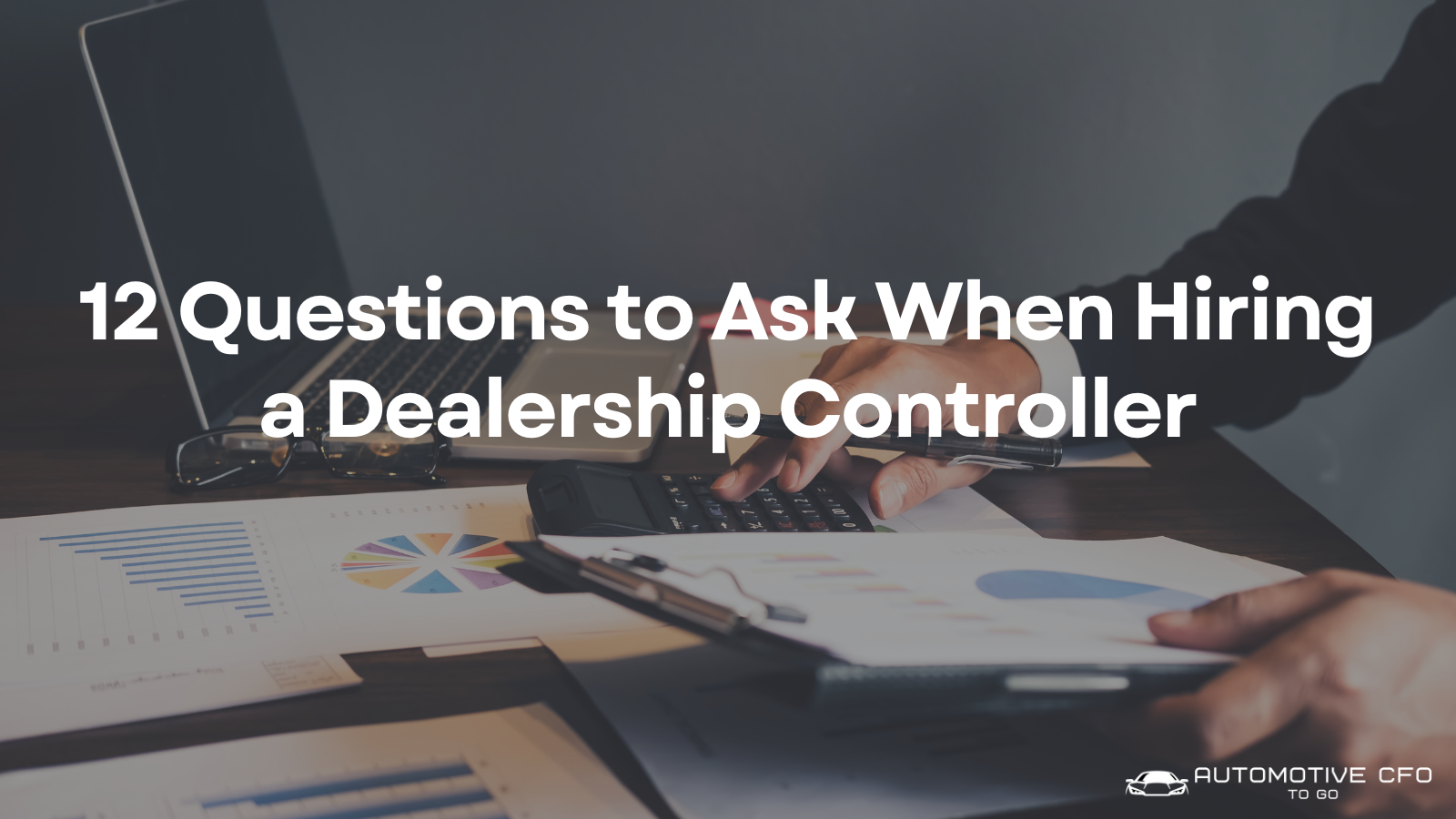 It’s clear that many dealerships are actively searching for experienced controllers. In Driving Blind: The Shortage of Seasoned Dealership Controllers, I discussed how this shortage has been developing for years, worsening over time. Now, we are witnessing its impact firsthand.
It’s clear that many dealerships are actively searching for experienced controllers. In Driving Blind: The Shortage of Seasoned Dealership Controllers, I discussed how this shortage has been developing for years, worsening over time. Now, we are witnessing its impact firsthand.
Running a dealership without a firm grasp of its financials is like driving without being able to see the road ahead. Dealership accounting managers, controllers, and office managers are doing their best, but a significant challenge is the lack of available training, coaching, and mentorship. Without proper support, many—through no fault of their own—struggle to navigate the complexities of dealership financial management, leading to costly mistakes and inefficiencies. The industry must step up to bridge this gap.
Dealers Are Navigating Hiring Challenges Without Much Support
Most dealers aren’t deeply familiar with dealership accounting, making the process of hiring a controller particularly challenging. Their expertise often lies in sales or fixed operations—areas manufacturers prioritize when awarding franchises. Over the past decade, I’ve noticed manufacturers becoming more lenient regarding a dealer candidate’s financial expertise. While this may help dealers gain approval, it often leaves them unprepared for the financial complexities of running a dealership.
Rather than focusing on the broader implications of this trend, let’s zero in on practical ways to help dealers and owners who need to hire an accounting manager or controller.
Why Asking the Right Questions When Interviewing a Dealership Controller Is Critical
Hiring the right dealership controller is not just about filling a position—it’s about ensuring the financial stability and operational efficiency of the dealership. Controllers oversee complex financial transactions, compliance, cash flow, and reporting, making them one of the most strategic hires a dealer can make. Asking the right questions during the interview process is crucial for several reasons:
1. Ensuring Industry-Specific Knowledge
Automotive accounting is unique compared to traditional business accounting. A dealership controller must understand:
- Dealership operations
- Floorplan management
- Incentives and warranty receivables
- DMS systems like CDK, Reynolds & Reynolds, or Dealertrack
- Sales tax compliance, sometimes including multi-state transactions
- And much more.
By asking about their experience in these areas, you can gauge whether they have the specific skills needed for a dealership environment.
2. Verifying Problem-Solving and Decision-Making Skills
A dealership controller is often the one identifying financial risks, inefficiencies, and fraud. Asking situational questions (like: “Tell me about a time you found a major accounting discrepancy—how did you handle it?”) helps determine their ability to think critically and take decisive action when needed.
3. Assessing Leadership and Communication Abilities
Controllers don’t just crunch numbers—they collaborate with sales, service and parts departments. They also work closely with the dealer principal or GM to provide financial insights. Questions about how they’ve trained teams, communicated financial concerns, or worked cross-departmentally reveal whether they can effectively lead the accounting office.
4. Understanding Their Approach to Compliance and Controls
With increased factory audits, tax regulations, and compliance requirements, a dealership controller must implement strong internal controls. Well-placed questions will help you assess their risk management mindset.
5. Finding the Right Cultural Fit
A controller will work closely with the dealership’s leadership team, so their work style, values, and personality should align with the dealership’s culture. Asking about how they handle pressure, tight deadlines, and conflicting priorities will provide insight into whether they are a good long-term fit.
12 Great Questions to Ask When Hiring a Dealership Controller
After years in the car business, I’ve refined these questions to help dealers make more informed hiring decisions. When asked strategically, they provide valuable insights, ensuring a dealer selects the right candidate for the role. Here are the most important questions to ask when hiring a dealership controller.
1. You discover that the dealership’s net profit has been steadily declining over the past three months. How would you approach diagnosing the issue, and what steps would you take to address it?
2. How do you stay updated with changing accounting standards and finance regulations specific to the automotive industry?
3. Please share your experience with cash flow management and working capital optimization?
4. How do you ensure compliance with accounting standards, regulations, and tax laws in the automotive sector?
5. Describe your experience with forecast preparation and monitoring.
6. How do you handle difficult conversations with stakeholders, such as dealership owners or manufacturers?
7. Can you describe your experience with internal controls and how you’ve addressed control issues in the past?
8. How do you streamline financial reporting processes and increase especially during month-end and year-end closing periods?
9. Can you share an example of a time when you identified and resolved a major accounting issue?
10. How do you ensure compliance with manufacturer financial reporting?
11. How do you handle disagreements or conflicts within your team or with other departments?
12. Discuss your experience with financial audits. How do you prepare for and manage audits?
These questions are tailored to assess the candidate’s experience in dealership accounting, their knowledge of industry-specific regulations, and their ability to manage the unique challenges of automotive dealership accounting and financial management.
Final Thought
The wrong hire in this role can lead to financial mismanagement, compliance issues, and operational inefficiencies—costing the dealership time and money. Taking the time to ask the right questions ensures you find a controller who not only understands dealership accounting but also fits within your organization and can drive financial success.
Like this post? Subscribe to the Kruse Control Newsletter. Get more cutting-edge insights, exclusive content, and a dash of humor delivered weekly to your inbox!
